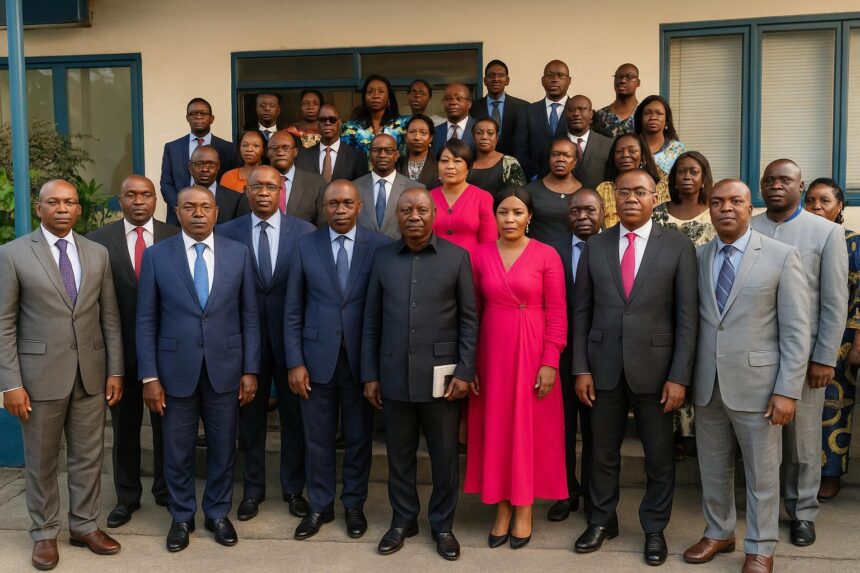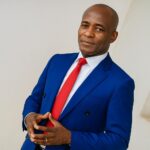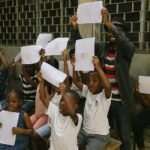A city of words
From dawn on 26 September, the garden of the French Institute in Brazzaville filled with backpacks, notebooks and camera phones as the eighth Rentrée littéraire du Congo, affectionately called Relico, launched its 2025 edition in an unusually compact one-day format.
Traditionally spread over three busy days, the festival’s compressed timetable felt more like a relay race than a marathon, yet every chair was taken and latecomers leaned against mango trees, proof that the city’s appetite for stories remains as hearty as its famous grilled fish.
Keynote celebrates roots
Opening proceedings, writer and departmental book director Alphonse Chardin N’Kala delivered the ceremonial lesson, weaving personal memories of a childhood spent between riverside libraries and village storytellers into a broader reflection titled The Book as Cultural Root and Gateway to the World.
He argued that every page turned in Madingou or Impfondo plants a seed of pride while simultaneously swinging open a window on distant horizons, a double movement he believes essential for young Congolese navigating globalised playlists, algorithms and, soon, the African Continental Free Trade Area.
N’Kala’s call to “protect the book to protect the self” set the tone for a day defined by handshakes, selfie requests and impromptu TED-style talks in the corridors, where senior poets exchanged WhatsApp contacts with high-schoolers clutching dog-eared copies of Le Pleurer-Rire.
Authors showcase new voices
The first round-table, steered by critic Fidèle Biakoro, showcased five authors whose new releases test the festival’s twin watchwords of rootedness and openness, flipping effortlessly from sensual verses to political allegory without losing the Brazzaville cadence that makes Congolese French instantly recognisable.
César Balthazar Obambi drew whispers of admiration with Des mots, de l’amour et des larmes, a poetry collection where roses bleed and hearts heal; moments later, Octave Mouandza’s Longue vie pour rien offered a sombre parable on social drift that felt uncomfortably timely for many students.
The microphone then passed to Kali-Tchikati, whose Les ailes du rescapé turned trauma into a quest for dignity, and to Dominique Asie de Marseille, whose novel La République du colonel served up a sly, almost cinematic critique of power and perseverance across the continent.
Finally, Lewa-Let Mandah lifted spirits with L’appel au devoir patriotique, a hybrid text mixing autobiography, rallying cry and late-night café debate, prompting moderator Biakoro to remark, amid applause, that novels can sometimes do the work of talk shows, budget hearings and marching bands combined.
Publishers chart the next chapter
Away from the spotlight but no less vital, the second panel gathered publishers Mukala Kadima Nzuji of Hémar and Weldy Télémine Kiongo, better known as ING, of Mwéné Édition, to dissect printing costs that have risen like freight on the Congo River and equally capsize small presses.
Both speakers called for a national distribution grid, gentle tax incentives and stronger reading committees; in the audience, Modeste Gboko from Fnac warned that brilliant books die on shelves without marketing, while academic Omer Massoumou insisted excellence must not be sacrificed on the altar of speed.
Their dialogue resonated with many young entrepreneurs perched at the back, some of whom already sell chapbooks via Instagram reels and motorcycle delivery, confirming that Relico is not only a cultural rendez-vous but a barometer for how creativity might fuel tomorrow’s green, knowledge-based economy.
When literature meets music
If books fed the mind, the third and final conversation fed the ears, as musicologist Ninelle Balenda invited essayist Ferréol Gassackys to discuss Pachelbel, un génie méconnu, reminding listeners that Congo’s rumba roots share distant chord progressions with the German baroque composer’s famous Canon.
The stage soon filled with new voices: Émile Gankama dissected urban illusions in his novels, Nicole Mbala read tender drafts inspired by lockdown, Étienne Pérez Epagna unpacked faith and betrayal in Le rêve piégé de Manza, and Malachie Cyrille Ngouloubi, represented by a colleague, unveiled activist poems.
Balenda summed up the session with a smile, noting that Congolese creativity willingly dances between text and tempo, and that young readers in the hall, phones held high, were already clipping snippets for TikTok stories that would carry local literature far beyond the Oyo Bridge.
Echoes that linger
As dusk coloured the river, PEN-Congo president Florent Sogni Zaou applauded volunteers and security teams for keeping the event smooth, insisting the shortened schedule had distilled rather than diluted Relico’s spirit of discovery, dialogue and, above all, community resilience through the written word.
When closing guest Zacharie Bowao spoke of “a booming literary youth ready to lift the nation’s voice”, applause rolled like thunder along the Congo, echoing a sentiment many participants carried home: even a single day, properly curated, can open a lifetime chapter in readers’ hearts.
Organisers confirmed that video highlights and a downloadable catalog will be posted this week, enabling absent readers to catch up.





















